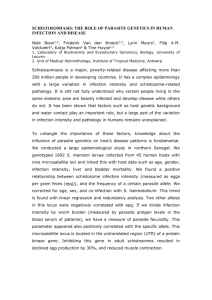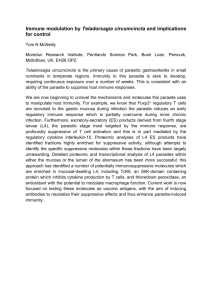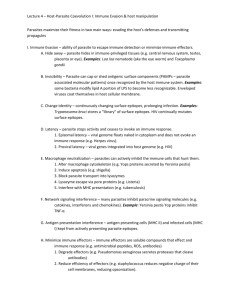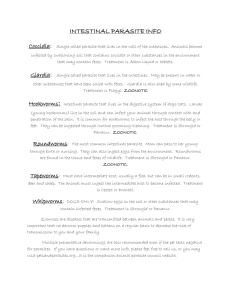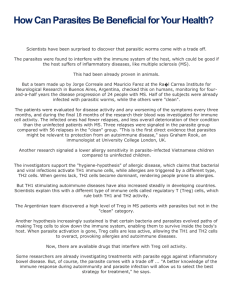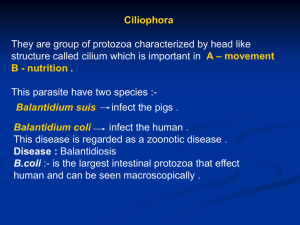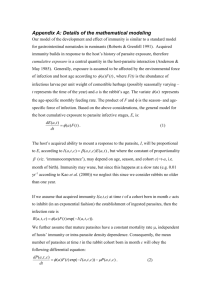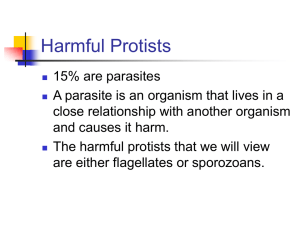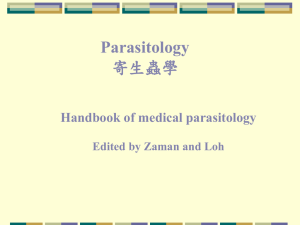immune response lecture3
advertisement
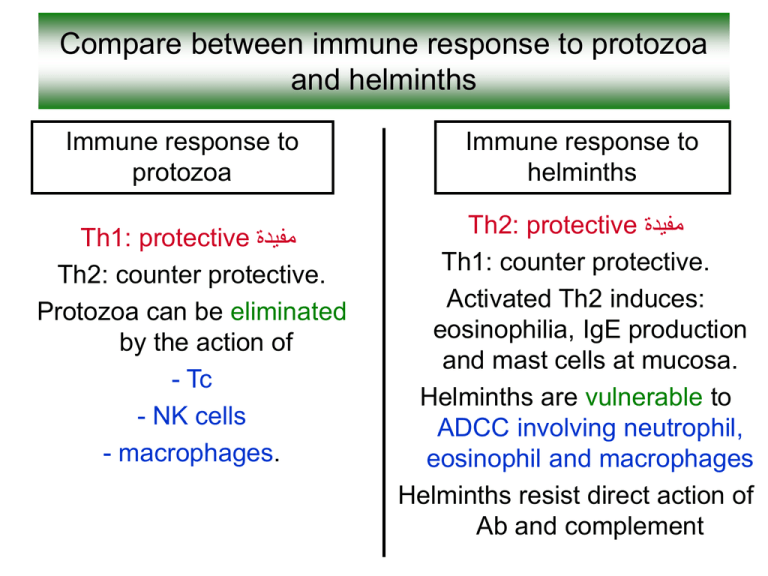
Compare between immune response to protozoa and helminths Immune response to protozoa Th1: protective مفيدة Th2: counter protective. Protozoa can be eliminated by the action of - Tc - NK cells - macrophages. Immune response to helminths Th2: protective مفيدة Th1: counter protective. Activated Th2 induces: eosinophilia, IgE production and mast cells at mucosa. Helminths are vulnerable to ADCC involving neutrophil, eosinophil and macrophages Helminths resist direct action of Ab and complement M.C.Q. The following helminth can evade the immune system by antigen disguise: a- Ancylostoma duodenale c- Schistosoma mansoni d- Ascaris lumbricoides b- Enterobius vermicularis The following parasite can evade the immune system by cleavage of the produced antibodies: a- Schistosoma mansoni c- Trichuris trichiura b- Giardia lamblia d- Trypanosoma cruzi Importance of Immunodiagnosis in Parasitology Immunodiagnosis is especially important in diagnosis of: • Visceral larva migrans Because we cannot precisely locate the parasite. • Hydatidosis, Trichinosis and Cerebral Toxoplasmosis Because sampling may be dangerous to the patient. • Early and Chronic phases of infection Because parasitic stages may not appear in excreta. • Fascioliasis To differentiate true from spurious infections. • In epidemiological studies Large numbers of specimens can be simultaneously tested. Immunodiagnosis rely on identification of: Antibody OR Antigen Found in serum, body fluids and faeces Immunodiagnostic Methods 1- Serology: in vitro testing - Based on reaction between Antigen and Antibody. - Can detect and quantify parasite Ag in blood, urine and stool (coproantigen). - Can detect specific Ab response to parasite Ag. Ag detection is more useful than Ab detection: - For diagnosis of infection in immunosuppressed. - For diagnosis of active infection. 2- Skin tests: used to detect: Immediate skin reactivity to parasite Ag (15-30 min.) Delayed skin reactivity to parasite Ag (24-48 hours) Disadvantages and Limitations of Immunodiagnosis • It can give false results due to cross reactivity between parasites. • Skin testing can result in hypersensitivity reactions. Advantages of serological tests over skin testing Serological tests Tests are safe (in vitro) More sensitive and specific Easy to differentiate between old and recent infection Skin testing Anaphylaxis may occur Less sensitive and specific Less easy Give reason Red cell structure can provide some resistance against infection with Plasmodia. Duffy antigen Absence of Duffy antigen: Duffy antigen present on RBCs acts as a receptor for Plasmodium vivax. Its absence limits infection with this parasite. Haemoglobin S: its presence in RBCs provides immunity against Plasmodium falciparum because the parasite cannot feed on this type of haemoglobin. Deficiency of the enzyme G6PD: This enzyme is needed by Plasmodium falciparum parasite to develop inside the infected RBC. Give reason Occurrence of nephrotic syndrome complicating chronic Plasmodium malariae infection. Due to the deposition of antigen-antibody complexes (immune complexes) which are deposited on the basement membrane of the Kidney. Such immune complexes activate the complement system resulting in host tissue damage. Bronchial asthma Means: difficulty in breathing Parasitic infections that may be associated with bronchial asthma: Cause of bronchial asthma: 1- Fascioliasis. 2- Ascariasis. 3- Ancylostomiasis. An allergic reaction to parasite antigens and metabolites Mediated by IgE 4- Visceral larva migrans. 5- Bodies of living and dead mites and their excreta. How Parasites Produce Bronchial asthma Parasite antigens and metabolites are released IgE is produced Fab Fc Eosinophil Mast cell Mediators Broncho-spasm Application of molecular techniques in Parasitology 1- Classification of Parasites. 2- Studying the biology of Parasite. 3- Development of new drugs. 4- Diagnosis of difficult cases. 5- Vaccine development: safe, protective, cheap, easy to transport and store. 6- Helping Epidemiology and Control measures: by studying the various strains of the parasites to get ready by the suitable control measures.
